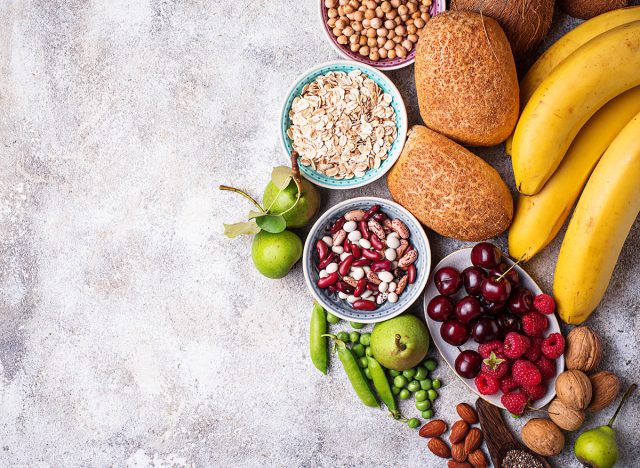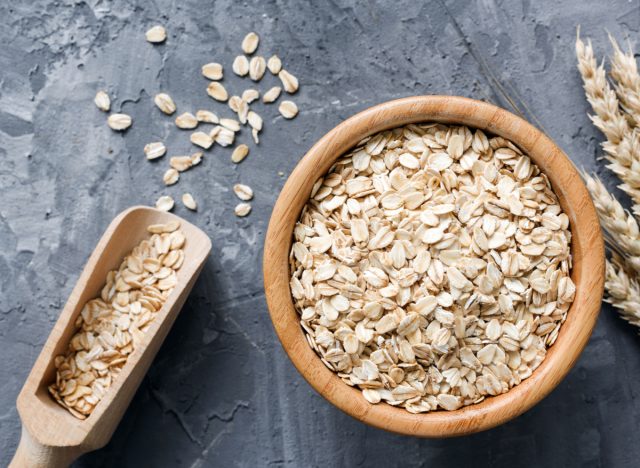Eating Habits Aging Your Body By a Decade, Say Dietitians

Did you know that what you eat and drink can take away years from your life? In fact, certain types of food can actually increase the speed at which your cells age, while others have powerful antioxidants that can help slow the process of aging down.
Not only does food play an important role in the aging process, but research within the last few years has also shown that your gut microbiome is crucial for strengthening your immune system as you age, helping to prevent age-related diseases.
But how can you know which foods to eat and which ones to avoid as you grow older? To find out, we talked with a few expert dietitians to get their advice on certain eating habits that will most certainly speed up the aging process. Read on to find out the worst eating habits you should give up to avoid aging faster than you should, and for more on how to eat healthy, don’t miss The #1 Best Juice to Drink Every Day, Says Science.
Eating processed foods

Eating too much processed food is one of the most common, yet harmful, eating habits that will speed up your aging process. This is mainly because these types of foods, which are usually high in refined carbs, added sugar, and dangerous fats, are known to contain AGEs (advanced glycation end-products).
According to Trista Best, MPH, RD, LD, a registered dietitian at Balance One Supplements, AGEs are formed when sugar is combined with fat or protein, and they can greatly speed up the aging process as well as harm your gut health.
More specifically, AGEs have been found to age your skin as well as contribute to an increased risk of age-related illnesses such as Alzheimer’s disease.
Not eating enough fiber

Another important component of healthy aging is including enough fiber in your daily diet, which can come from foods like oats, beans, apples, pears, almonds, and seeds.
Your daily fiber intake is crucial because not only does it keep your digestion healthy, but it’s also been proven to help lower cholesterol, manage weight, and even help prevent diabetes and cardiovascular disease.
As you can see, without enough fiber, your body will age far more quickly. “Research has long shown that habitually eating a low-fiber diet increases the risk of developing heart disease and diabetes, both of which are conditions that accelerate aging,” says registered dietitian in private practice, Kylie Ivanir, RD.
To increase your fiber intake, try eating oatmeal for breakfast, or adding beans to your lunch. You can also talk with your doctor about incorporating a fiber supplement into your daily routine.
Eating too much added sugar

Consuming too much added sugar not only ages you by increasing your risk of certain diseases, but it is also linked to poor skin health as well.
“High-sugar diets can cause spikes in blood sugar and lead to insulin resistance, which has been linked to diabetes, heart disease, and stroke,” says Janet Coleman, RD a registered dietitian with The Consumer Mag, “and the natural process of glycation breaks down collagen in your skin and makes your complexion duller as well.”
One study from The American Journal of Clinical Nutrition found that consuming added sugar in processed foods was associated with increased “frailty” in older populations, meaning less physical activity and unwanted weight loss.
Not including prebiotics

Maintaining a healthy gut is one of the best ways to help slow the aging process, so incorporating prebiotic-rich foods on a daily basis can help.
“Prebiotics are the fuel for the beneficial bacteria within our gut, so when we eat prebiotic-rich foods daily, we are improving our gut health. This is important because good gut health is linked to a stronger immune response, which will decrease the likelihood of succumbing to illness; reduced inflammation, which can prevent aches and pains; and a supported mood, which can prevent anxiety and depression,” says Kara Landau, RD a registered dietitian and founder at Uplift Food.
Thankfully, you have plenty of prebiotic foods to choose from, so you’ll be able to find the ones that you actually love to eat. Some prebiotic-rich foods include oats, beans, legumes, spinach, blueberries, asparagus, apples, or garlic.